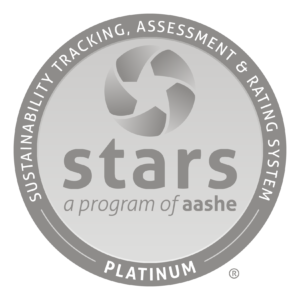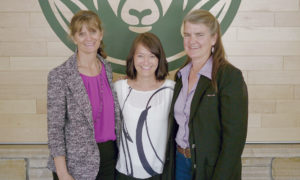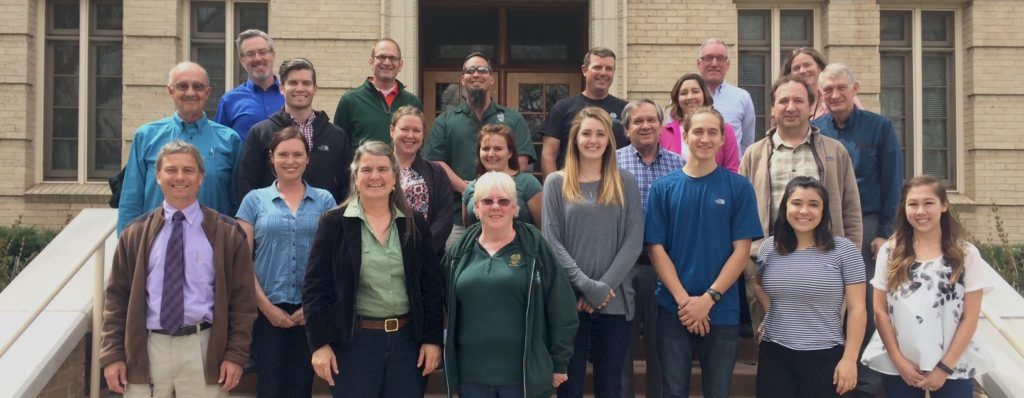The members of CSU’s President’s Sustainability Commission represent departments, committees and areas university-wide.
Colorado State University has a long history of sustainability commitment, dating back to its foundation as a land-grant institution.
Continuing this tradition in 2018, CSU ranked in the top six in all major higher education sustainability indexes, including Princeton Review and Sierra Club. The campus has shown consistent achievement of university-wide sustainability efforts through students, faculty and staff in many areas across campus, such as academics, research, student engagement, operations, planning, and administration.
The mission of the President’s Sustainability Commission is to facilitate the effective integration of sustainability across all aspects of the University. One of three presidential commissions on campus, PSC was formally established in 2017, after several years as the President’s Sustainability Committee. It is composed of professional staff and student representatives from across the University. Vice President of University Operations Lynn Johnson serves as the liaison to the president’s cabinet, and the commission is co-chaired by Carol Dollard of Facilities Management and Tonie Miyamoto of Housing & Dining Services. The commission has the important role of providing the president and cabinet a variety of perspectives on sustainability from an environmental, economic, and social justice lens.
 Data gathering, analysis
Data gathering, analysis
One of the PSC’s responsibilities is analyzing and gathering data of CSU’s efforts in reaching sustainability goals and submitting the Sustainability Tracking, Assessing and Rating System (STARS) report to the Association for the Advancement of Sustainability in Higher Education. This highly comprehensive tracking system uses more than 1,000 fields and data tracking points to measure an institution’s efforts toward promoting and practicing sustainability. In 2015, CSU became the first university in the world to earn the highest rating, Platinum, in STARS. In 2017, CSU became the first university in the world to earn a second Platinum rating. To date, there are five institutions that have achieved Platinum: four in the U.S. and one in Canada.
“A big success from the PSC has been ‘connecting the dots’ across campus to get researchers, operations staff and students all aligned on projects,” Dollard says. “The alignment helps us get farther faster on sustainability efforts.”
An example of this is the pollinator project, which was initiated by a student who expressed concerns to the President’s Office over dandelion removal and the resulting impact on local bee populations.
President’s Sustainability Commission
Mission Statement: Promote and facilitate the effective integration of sustainability across all aspects of the University.
Goals:
- Advocate for sustainability efforts across the University and empower students, faculty and staff to propose and pursue new ideas and initiatives to advance sustainability
- Advise on university-wide sustainability initiatives, including but not limited to STARS, master planning, learning outcomes, budgets, campaigns, community and public partnerships, and new buildings
- Help connect sustainability efforts across the University (including academics, research, operations, student engagement, administration and public outreach).
- Utilize STARS as a framework to help measure progress and develop and maintain a University-wide Sustainability Strategic Plan that feeds into and supports the CSU Strategic Plan
- Report the Campus Greenhouse Gas Inventory annually and update the Climate Action Plan biannually
Through a series of collaborations across the campus community, a Pollinator Friendly Campus Committee was founded as a subcommittee of PSC, and there are now bee hives and pollinator-friendly gardens on campus. Through these efforts, CSU also became certified as a Bee Campus USA.
Specific goals and objectives are identified in the PSC’s guiding document, the Sustainability Strategic Plan. This plan not only helps achieve the operational goals in CSU’s Climate Action Plan, but also addresses the social justice and economic aspects of sustainability that are critical to a universal approach that considers and engages the entire campus community. Each goal outlined in the plan correlates to one of the 11 goals in the University’s Strategic Plan, ensuring that sustainability efforts are in lockstep with the University’s goals.
Holistic approach

Having a holistic, systemwide approach is what helps make CSU’s sustainability achievements possible, with the sum of the parts being greater than the whole. From the Platinum-level bicycle-friendly university designation to climate change research to sustainability-related majors and minors in all eight colleges and the School of Global Environmental Sustainability (SoGES), the University is leading the way collectively to a greener future. Interestingly, CSU doesn’t rely on a single office or group to achieve sustainability goals. It requires the collective effort, passion and enthusiasm of everyone.
“We are all in this together. When more people have a sense of ownership or responsibility, we go further,” says PSC member Stacey Baumgarn. “Sustainability isn’t one person’s or one office’s job – it belongs to all of us. Sustainability at CSU is inclusive of research and teaching, academics, curriculum, administration, outreach and engagement, and operations. One office would be hard-pressed to do all those things. So, not having a central office might be considered a challenge, however without one, there is a role and an opportunity for all of us.”
CSU has lofty environmental goals, including the overarching goal of working toward the Climate Action Plan (CAP) commitment adopted in 2010, defining a path toward climate neutrality. The CAP outlines strategies to guide the university to 75% reduction in net carbon emissions by 2030 and 100% by 2050. The University has also committed to 100% renewable electricity by 2030. With the guidance of the PSC, CSU is positioned well to meet these goals.
“The greatest strength of PSC and sustainability at CSU in general is the deep level of commitment and collaboration throughout campus from the President’s Office to the colleges to students,” says Miyamoto. “At all levels, we see new ideas and initiatives coming forward, and that is so exciting. We face very serious challenges related to climate change, and I am proud that CSU is one of many institutions willing to face that challenge head-on and utilize education, research, and engagement to make a difference.”
